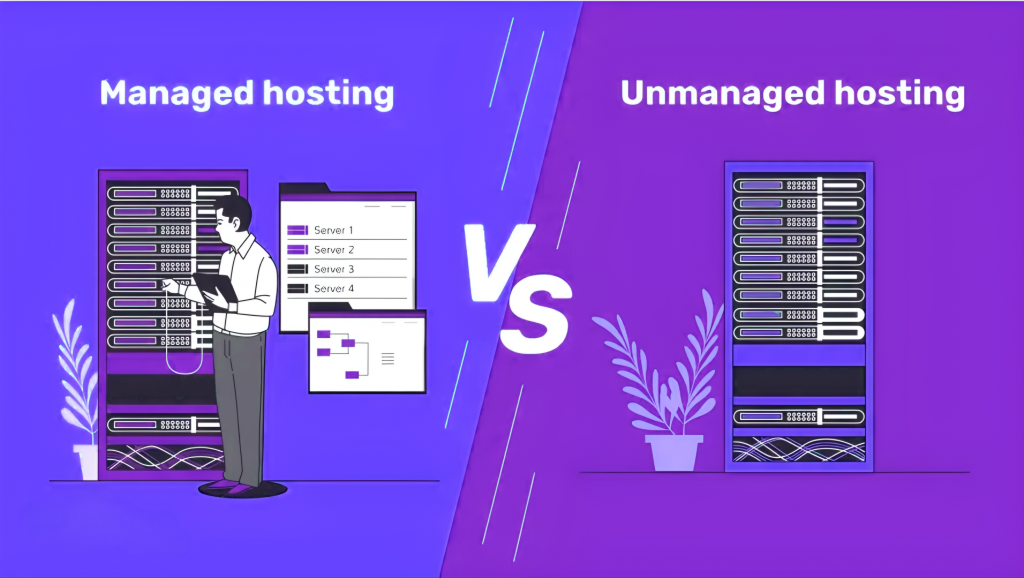Understanding the Basics
What is Managed Hosting?
Managed hosting is a service where the hosting provider handles all technical aspects of running a server, including:
- Server setup and configuration
- Security updates and patches
- Performance monitoring
- Backup management
- Technical support
- Problem resolution
What is Unmanaged Hosting?
Unmanaged hosting provides only the server infrastructure, leaving all management tasks to the customer:
- Raw server access
- Basic network connectivity
- Power supply
- Physical security
- Hardware maintenance
Detailed Comparison
Managed Hosting: Pros and Cons
Advantages
- Hands-off Management
- Automatic updates and patches
- 24/7 monitoring and support
- Regular backups
- Security management
- Expert Support
- Technical expertise on demand
- Quick problem resolution
- Proactive maintenance
- Performance optimization
- Time-Saving
- Focus on core business
- Reduced IT staffing needs
- Faster issue resolution
- No learning curve
Disadvantages
- Higher Costs
- Premium pricing for services
- Monthly management fees
- Additional service charges
- Less Control
- Limited root access
- Restricted customization
- Standardized configurations
- Fixed update schedules
Unmanaged Hosting: Pros and Cons
Advantages
- Complete Control
- Full root access
- Custom configurations
- Flexible software choices
- Personalized security
- Cost-Effective
- Lower monthly fees
- No management premiums
- Scale as needed
- Pay for what you use
- Flexibility
- Choose any platform
- Custom optimization
- Unique configurations
- Specialized solutions
Disadvantages
- Technical Expertise Required
- System administration skills
- Security knowledge
- Troubleshooting abilities
- Time investment
- Time-Consuming
- Manual updates
- Regular maintenance
- Problem diagnosis
- Security management
Who Should Choose Managed Hosting?
Ideal for:
- Small to Medium Businesses
- Limited technical resources
- Focus on core business
- Need reliability
- Value support
- E-commerce Sites
- Need high uptime
- Security requirements
- PCI compliance
- Regular backups
- Content-Based Websites
- Blog platforms
- News sites
- Portfolio sites
- Marketing websites
Best For:
- Companies without IT staff
- Time-sensitive projects
- Mission-critical applications
- Security-conscious organizations
When to Choose Unmanaged Hosting
Perfect for:
- Development Teams
- Custom environments
- Specific configurations
- Testing needs
- Development flexibility
- Technical Organizations
- In-house IT teams
- System administrators
- DevOps practices
- Custom requirements
- Large Enterprises
- Dedicated IT departments
- Specialized needs
- Custom security
- Complex configurations
Ideal When:
- Technical expertise available
- Custom solutions needed
- Budget constraints exist
- Maximum control required
Cost Comparison
Managed Hosting Costs
Entry Level
- Price Range: $50-150/month
- Features:
- Basic management
- Limited resources
- Standard support
- Essential monitoring
Business Level
- Price Range: $150-500/month
- Features:
- Full management
- Advanced resources
- Priority support
- Complete monitoring
Enterprise Level
- Price Range: $500+/month
- Features:
- Premium management
- Unlimited resources
- 24/7 dedicated support
- Advanced monitoring
Unmanaged Hosting Costs
Basic Server
- Price Range: $20-80/month
- Features:
- Server access
- Basic resources
- No management
- Self-support
Advanced Server
- Price Range: $80-300/month
- Features:
- Higher resources
- Better hardware
- Network features
- Basic monitoring
High-Performance
- Price Range: $300+/month
- Features:
- Premium hardware
- Maximum resources
- Advanced network
- Self-managed
Hidden Costs to Consider
Managed Hosting
- Additional Services
- Backup storage
- SSL certificates
- Additional monitoring
- Premium support
- Resource Overages
- Bandwidth excess
- CPU usage
- Storage space
- Memory usage
Unmanaged Hosting
- Internal Costs
- Staff salaries
- Training
- Tools and software
- Time investment
- Emergency Services
- External support
- Crisis resolution
- Recovery services
- Security incidents
Making Your Decision
Decision Factors
- Technical Expertise
- Available staff
- Knowledge level
- Learning capacity
- Time availability
- Budget Considerations
- Initial budget
- Monthly spending
- ROI expectations
- Growth plans
- Business Requirements
- Uptime needs
- Security requirements
- Compliance needs
- Growth projections
Decision Matrix
| Factor | Choose Managed If | Choose Unmanaged If |
|---|---|---|
| Expertise | Limited technical staff | Strong technical team |
| Budget | Higher budget available | Cost-sensitive |
| Time | Focus on core business | Can manage servers |
| Control | Standard setup needed | Custom setup required |
| Support | Need immediate help | Self-sufficient |
Implementation Tips
For Managed Hosting
- Provider Selection
- Check support levels
- Review SLAs
- Compare features
- Verify reputation
- Setup Process
- Define requirements
- Plan migration
- Test environment
- Monitor performance
For Unmanaged Hosting
- Preparation
- Train staff
- Document procedures
- Set up monitoring
- Plan maintenance
- Implementation
- Configure security
- Set up backups
- Establish protocols
- Create documentation
Conclusion
The choice between managed and unmanaged hosting depends on your organization’s specific needs, resources, and capabilities. Managed hosting is ideal for businesses focusing on their core operations without technical expertise, while unmanaged hosting suits organizations with technical skills seeking control and customization.
Key Takeaways
- Assess your technical capabilities
- Consider total cost of ownership
- Evaluate business requirements
- Plan for growth
- Consider support needs
Choose managed hosting if you value peace of mind and have the budget for it. Opt for unmanaged hosting if you have the technical expertise and prefer complete control over your environment.
